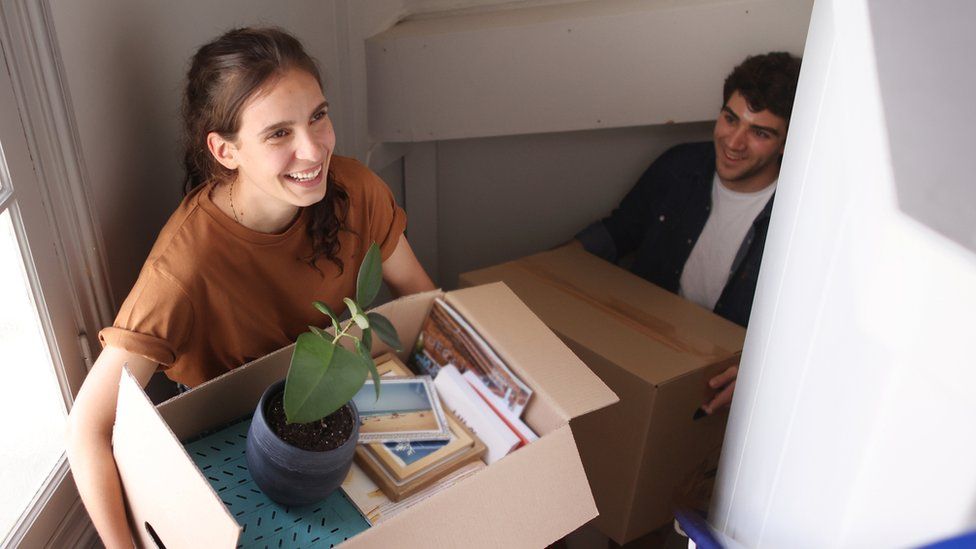
With rents rising, lots of people are crunching the numbers to see if they can afford to buy their own home.
But it is a big financial commitment, with risks if house prices fall or if you need to relocate.
So what do you need to know to help you decide?
Most people spend less each month on their mortgage payments than they would on rent for a similar property, according to the Halifax.
Halifax's most recent Owning vs Renting review found on average the monthly mortgage costs for a three-bed home were £42 lower than renting the equivalent.
But the difference varies widely across the UK.
Homeowners in Scotland make big savings compared to renters. While in the east of England it is cheaper to rent than to own.
First-time buyers can apply for the same mortgage deals as any other borrower. But banks and building societies will look very closely at a first-time buyer's financial situation and credit record.
After a year of steadily rising interest rates, mortgage rates have also gone up, to between 4% and 7%.
Mortgage brokers like Riz Malik at R3Mortgages say that it can be hard for first-time buyers to borrow large amounts, as lenders are getting tougher over affordability criteria.
Typically, a bank might lend you four or five times your salary.
It also depends on what outgoings you have. If you already owe money, such as a car loan, or have student debt, that will be taken into account.
A lot of money advice websites have calculators to help you work out what you can afford and mortgage brokers can help you identify deals to suit your situation.
The average house price for a first-time buyer is just over £300,000.
Saving a large enough deposit is the biggest hurdle for many would-be homeowners, one of the reasons the average age of a first-time buyer has risen to 32.
Usually you need a deposit worth at least 10% of the property's value. But the bigger your deposit, the better deal you will get from the lender.
The average deposit for first-time buyers is £62,470 according to Halifax, almost double the UK's average annual salary, with people typically putting down around 20% of the purchase price of their property.
Some lenders will accept a deposit of 5% of the property's value. Skipton Building Society is even offering a no-deposit mortgage. It is the first mortgage to cover 100% of the value of the property since the financial crisis and uses your history as a rent-payer to establish credit-worthiness.
If you are saving for a deposit and you are between 18 and 40, the government will match 25% of any money you save in a Lifetime ISA.
More than 60% of first-time buyers are opting for joint-ownership and that's not just couples. Increasingly friends are choosing to buy together too, says Aneisha Beveridge, head of research at Hamptons Estate Agency.
Any joint arrangement should be drawn up with a proper legal contract, as all parties will be liable for the full mortgage, says Ms Beveridge.
A first-time buyer is someone who has never owned or part-owned a property before. That offers a tax advantage as long as you are buying a property to live in.
In England and Northern Ireland first-time buyers don't pay stamp duty - a tax based on the value of the property you're buying - on properties worth less than £425,000.
Scotland's equivalent, the Land and Buildings Transaction Tax, is waived for first-time buyers of properties worth less than £175,000.
There is no first-time buyer relief for the Wales' Land Transaction Tax.
The biggest government scheme to support home-buyers, Help to Buy, has ended (except in Wales), although recently there have been reports the government is considering a reboot.
There are others including the First Homes scheme, aimed at helping first-time buyers and keyworkers with a household income under £80,000 (or £90,000 in London) to buy new-build properties.
Shared ownership schemes allow you to buy a share of the property and pay rent for the rest, with the option of increasing your stake when you can afford to.
Neither of these schemes are on the scale of Help to Buy, says David Hollingworth at L&C Mortgages. Help to Buy helped ramp up house prices, he adds, making them less affordable for first-time buyers today.










